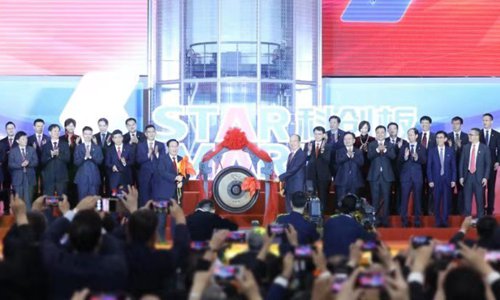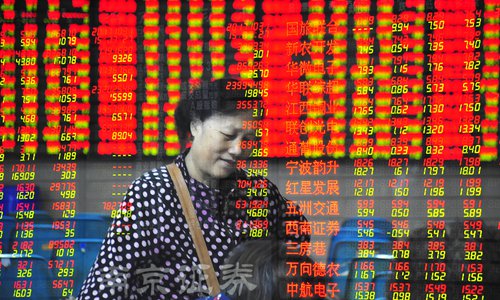HOME >> BUSINESS
Stocks surge at debut of Chinese tech board
By Song Lin and Xie Jun Source:Global Times Published: 2019/7/22 20:13:40
STAR to brew great tech companies: expert

Government officials and tech company executives witness the opening of the Science and Technology Innovation Board for China's high-tech startups on Monday at the Shanghai Stock Exchange. Photo: Courtesy of the Shanghai Stock Exchange
Heated trading welcomed the first day of China's new Science and Technology Innovation Board on Monday, as capital poured into the new board that aims to support homegrown technology start-ups in China.
The board, dubbed the STAR market, is China's answer to Nasdaq and a new stock trading venue for technology companies. It started trading at the Shanghai Stock Exchange at 9:30 am on Monday.
Though still short of household names, the new board is expected to grow into a stronghold of China's high-tech startups, incubating the country's future tech giants, experts said, adding that the new board provides a major financing channel for high-tech startups which often encounter fundraising difficulties through traditional financing channels.
As of 3 pm Monday, all 25 companies on the STAR market gained, with 16 of them doubling share prices. The first batches of companies on the new board include lithium battery material makers, machine vision intelligent manufacturing companies and medical technology firms.
Anji Technology shares led the rally with shares rising more than four-fold at 196 yuan ($28.5) per share.
The new board saw a turnover of 48.5 billion yuan on Monday, more than doubling the first-day 21.1 billion yuan turnover on the similar ChiNext board. Three STAR shares had a turnover of over 3 billion yuan.
Operated by Shanghai Stock Exchange, the board provides a new channel for China's high-tech companies to raise funds. The companies represent the future of China's high-tech sector, and will become a major pillar in support of China's efforts to boost its technological edge and challenge the technological and economic supremacy of the US, analysts said.
"Against the backdrop of the China-US trade war, the STAR market will also enhance the inclusiveness and openness of China's capital market, which is an important step for the opening-up of China's financial sector," Dong Shaopeng, an adviser for the China Securities Regulatory Commission, told the Global Times on Monday.
"The surge on the first day is understandable due to ample capital and relatively few companies. However, there needs to be a reasonable pricing benchmark," Dong said.

An investor checks stock market information at a brokerage in Nanjing, capital of East China's Jiangsu Province in November 2017. Photo: IC
Great future companies
The board is one of China's boldest attempts to reform its capital markets by adopting a market-oriented, registration-based IPO system. It was set up to permit significantly wider price swings than in other mainland exchanges. The board also allows companies and investors greater freedom on IPO pricing and the listing process.
The new board allows Chinese companies to list without a profit track record.
Regulations on the trading range have also been eased, as the new STAR board has no limits on price movements for the first five days of trading, after which a daily 20 percent limit will be imposed.
Li Chao, vice chairman of the China Securities Regulatory Commission, said on Monday that companies listed on the new board should perfect company management and disclose information in a genuine, accurate and complete manner.
China's technological development has amazed the world with the emergence of tech giants like Tencent and Alibaba, but most of them have turned to overseas bourses which have more flexible listing rules compared with A-shares.
"There are too few new economy companies being listed on the A-shares now. China shouldn't miss the future Alibabas and Tencents in its capital markets," Yang Delong, chief economist at the Shenzhen-based First Seafront Fund Management Co, told the Global Times.
Some overseas media reports said that STAR companies are not attractive enough, pointing to the lack of household names on the board.
Kang Chongli, director of the strategic department of Lianxun Securities, told the Global Times that many companies listed overseas don't have enough time to be listed on the STAR board in the first few batches. "But in the future, chances are that those companies, including well-known names like Meituan, will choose an IPO on the STAR market," Kang said.
Yang said the STAR bourse will focus on startups with technological innovation instead of mature companies, but those startups should have the potential to become tech giants.
"The goal of STAR is to build China's Nasdaq, and we look forward to great companies on this board," he said.
Newspaper headline: Stocks surge at debut of tech board